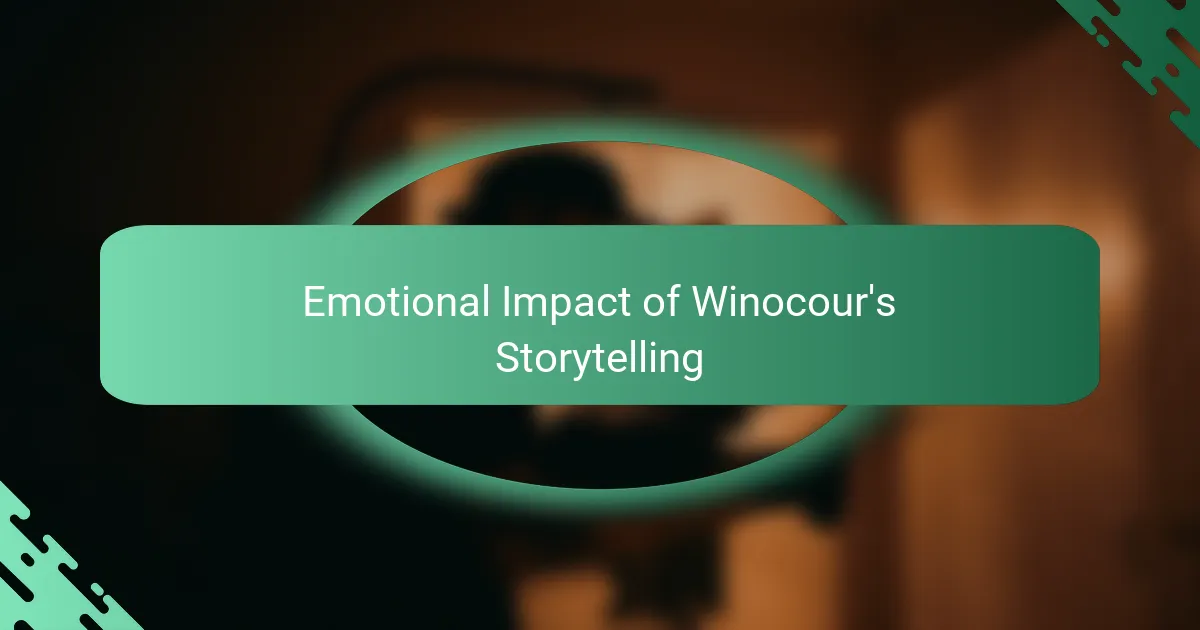Key takeaways
- French cinema often blends personal stories with societal critiques, focusing on themes like love, identity, and the complexity of relationships.
- Alice Winocour’s films feature strong female protagonists and explore motherhood, identity, and emotional depth, encouraging reflection on societal roles.
- Winocour’s storytelling is marked by immersive atmospheres and nuanced portrayals of human emotions, drawing viewers into relatable experiences.
- Key lessons from her work include the balance between personal aspirations and responsibilities, the importance of empathy, and the resilience found in vulnerability.

Overview of French Cinema Themes
French cinema is a treasure trove of themes that delve into the human experience, often blending the poetic with the political. I remember the first time I watched a classic French film—its nuances and emotional depth struck me in ways that Hollywood simply hadn’t. These stories frequently explore love, identity, and existential angst, inviting viewers to engage on a personal level.
One recurring theme in French films is the complexity of relationships, whether romantic or familial. Have you ever noticed how a simple glance between characters can hold so much meaning? I find that French filmmakers masterfully capture these subtleties, making even the quiet moments resonate profoundly in the audience’s heart.
Another significant theme is the exploration of societal issues, often depicted through unique character studies. It’s fascinating how these films can blend personal stories with wider cultural critiques. I can’t help but feel inspired by how filmmakers like Alice Winocour bravely tackle such subjects, navigating through the intricate dance between individual narratives and larger societal questions.

Introduction to Alice Winocour’s Work
Alice Winocour’s work resonates deeply with audiences, drawing them into the emotional landscapes she crafts with such finesse. I remember the first time I watched her film “Proxima.” The way she portrayed a mother’s struggle between her career and family responsibilities struck a chord with me; it felt like I was witnessing a reflection of many modern relationships.
Her films often explore themes of motherhood, identity, and the complexities of human connection. Here are some key aspects of her work that stand out:
- Realism in Character Portrayal: Winocour creates characters that feel genuine and relatable, reflecting real struggles.
- Strong Female Protagonists: Many of her films feature women grappling with societal expectations and personal dreams.
- Emotional Depth: She infuses her narratives with rich emotional layers, prompting viewers to connect on a personal level.
- Cinematic Visuals: Her use of visuals and sound enhances the storytelling, creating an immersive experience.
- Exploration of Isolation: Winocour often delves into themes of loneliness and the search for connection in a disconnected world.

Key Elements in Winocour’s Films
In Alice Winocour’s films, the exploration of complex human emotions stands out as a defining element. I often find myself drawn to how she navigates themes of connection, trauma, and resilience. For instance, in “Proxima,” the relationship between the mother and daughter is portrayed with such depth and authenticity that it evokes a strong emotional response, reminding me of my own experiences of separation.
Another key element in Winocour’s storytelling is her ability to create immersive atmospheres. I recall feeling physically present in the space of her films, as if I could almost touch the characters’ struggles and triumphs. This rich atmospheric approach helps viewers connect with the narrative on a more personal level, making their experiences relatable and impactful.
The nuanced portrayal of women in a variety of life circumstances also plays a central role in her work. It encourages viewers to reflect on their own identities and the societal pressures women face today. This dimension strikes a chord with many viewers, myself included, as it sheds light on familiar challenges while also celebrating the strength and agency of women.
| Key Elements | Description |
|---|---|
| Complex Human Emotions | Winocour delves into deep emotional themes, highlighting the nuances of relationships, particularly the bond between mothers and daughters. |
| Immersive Atmospheres | The rich environments she creates allow viewers to feel the characters’ emotions, making their experiences more relatable and engaging. |
| Nuanced Portrayal of Women | Her films often feature strong female characters navigating personal and societal challenges, encouraging reflection on women’s roles. |

Notable Movies by Alice Winocour
When it comes to notable works by Alice Winocour, “Proxima” truly stands out. This film, which centers on an astronaut preparing for a long mission away from her daughter, left me reflecting on the delicate balance between ambition and familial ties. I couldn’t help but root for the protagonist as she navigated her intense commitment to her career while also grappling with the heartbreak of leaving her child behind. It felt like a real-life dilemma that many parents face today.
Another striking film in Winocour’s oeuvre is “Maryland.” It tells the story of a soldier suffering from PTSD, exploring themes of trauma and the struggle for connection after devastating experiences. I found the portrayal so compelling that I was genuinely empathetic towards the character’s internal battles. The film’s exploration of isolation versus the need for human connection resonated with me, making it a relatable yet haunting experience.
Finally, “Django” is another important work worth noting. This film offers a glimpse into the life of Django Reinhardt, a jazz legend, while also addressing the challenges of being an artist during a tumultuous time. I appreciated how Winocour interwove the personal and political, crafting a narrative that speaks to the resilience of creativity in the face of adversity. It reminded me of how powerful storytelling can be in reflecting both individual and collective struggles.

Personal Reflections on Winocour’s Themes
Reflecting on Alice Winocour’s themes, I often find myself captivated by her nuanced portrayals of motherhood. Watching “Proxima” was an emotional journey; it made me think about the sacrifices mothers make for their ambitions. Have you ever felt torn between personal dreams and family obligations? I certainly have, and that film resonated with me on a profound level.
Isolation is another theme Winocour explores with remarkable authenticity. In “Maryland,” the protagonist’s battle with PTSD felt relatable, drawing me into the depths of mental struggle. I could almost feel the character’s sense of loneliness and the yearning for connection. It made me reflect on how crucial support systems are, especially for those facing unseen battles.
Moreover, Winocour’s depiction of strong female characters is incredibly inspiring. Each time I see one of her films, it sparks a conversation about women’s roles in society. Why do we often face hurdles in pursuing our passions? Her work challenges these norms, encouraging me to appreciate the strength and resilience found in everyday women, including myself.

Emotional Impact of Winocour’s Storytelling
The emotional impact of Alice Winocour’s storytelling truly resonates with viewers. I felt an intense connection with her characters, who are often depicted grappling with their identity and personal struggles. For instance, in her film “Proxima,” the portrayal of a mother balancing her career with her familial duties left a lasting impression on me, bringing back memories of my own experiences of juggling responsibilities.
Winocour has a remarkable ability to evoke empathy, drawing audiences into the emotional landscapes her characters inhabit. Her nuanced approach to storytelling invites us to reflect on our own lives and the complex nature of human relationships. I found myself questioning my own choices as I watched her characters navigate their challenges.
This deep emotional engagement, coupled with her skillful direction, elevates the viewing experience, making it not just entertaining but profoundly affecting.
| Winocour’s Themes | Emotional Impact |
|---|---|
| Identity | Fosters self-reflection and personal connection |
| Family Dynamics | Creates a sense of empathy and understanding |
| Career vs. Personal Life | Draws parallels to viewers’ own struggles |

Lessons Learned from Alice Winocour’s Films
When I reflect on Alice Winocour’s films, I notice she often explores themes of vulnerability and resilience. For instance, in “Proxima,” I felt a deep connection to the protagonist’s struggle between her professional aspirations and her role as a mother. This juggling act reminded me of my own experiences balancing career goals with personal commitments, heightened by the emotional depth portrayed on screen.
Another lesson I gleaned from her work is the importance of connection and understanding. The way Winocour crafts relationships, particularly in strained situations, resonates with anyone who has navigated their own challenging interactions. I remember a time when I had to confront misunderstandings with a close friend, and the nuanced portrayals in her films made me reassess how empathy can transcend difficult moments.
- Winocour emphasizes the balance between personal and professional life.
- Her focus on vulnerability reveals underlying strength in characters.
- Connections and understanding are vital themes, showcasing the power of empathy.
- Relationships in her films mirror real-life complexities, prompting personal reflection.
- Emotional depth invites viewers to engage empathetically with characters’ struggles.
